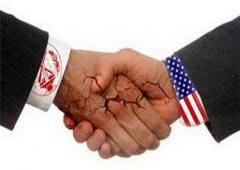Iran: A victim of Terrorism
“One should have a single, not a double, standard.”
These were the (translated) words of Iranian President Hassan Rouhani, speaking at a conference I recently  attended in Tehran. His observation was in reference to the habit of the United States & Co of decrying terrorism but then applauding terroristic behaviour when it serves their interests.
attended in Tehran. His observation was in reference to the habit of the United States & Co of decrying terrorism but then applauding terroristic behaviour when it serves their interests.
US mastery of the double standard means that, for example, the word “terrorism” is dutifully applied to situations in which planes are flown into US buildings, but not to ones in which US warships shoot down Iranian passenger jets , killing everyone on board.
A look at reality
While Iran is portrayed in Western and Israeli circles as a relentless supporter of terrorism worldwide, the conference focused on a less politically convenient reality: that of Iran as a victim of terror.
According to Iranian calculations, more than 17,000 persons have perished as a result of terrorist operations in the country since the Islamic revolution of 1979. The majority of these were perpetrated by the anti-government Mujahedin-e-Khalq (MEK).
Casualties have included three-year-old Fatima Taleghani, who burned to death when MEK members set fire to her room, teenager Zeynab Kamayee, who was reportedly suffocated with her veil, and 35-year-old Dariush Rezaeinejad, one of five Iranian scientists assassinated in recent years – apparently with the help of the Israelis
In Tehran, I spoke with Rezaeinejad’s widow, Shohreh Pirani, and the couple’s eight-year-old daughter, who advised her mother which family photographs to show me on the mobile phone.
A researcher and academic, as well as a deputy at the Atomic Energy Organization of Iran, Rezaeinejad was fatally shot in July 2011. Pirani described to me the devastating psychological aftermath of witnessing the shooting, but nevertheless, she stressed the sorrow she felt for the perpetrators of the crime; terrorist acts, she said, were driven by desperation.
‘Material support’
The US government has also demonstrated sympathy for select Iranian terrorists, albeit in a far less noble fashion. In 2012, the US state department delisted the MEK as a Foreign Terrorist Organization (FTO), despite reports of continuing terroristic activities.
Prominent journalist and constitutional lawyer Glenn Greenwald described the delisting as ” more vividly illustrat[ing] the rot and corruption at the heart of America’s DC-based political culture than almost any episode I can recall”.
While still on the FTO list, Greenwald wrote, the MEK had thrown large sums of money at an array of Democratic and Republican personalities, journalists, and other opinion shapers, who then became advocates for the organisation.
Along with previous training sessions in the US for MEK operatives, Greenwald argued that such collaborative arrangements seemed to constitute “material support” for terrorism – a felony under US law.
But the US justice system prefers to reserve this crime for hapless Muslims, like Syed Fahad Hashmi, a US citizen and Brooklyn College graduate sentenced to 15 years in prison – following several years of pre-trial solitary confinement – for allegedly providing material support to al-Qaeda.
What was the exact nature of Hashmi’s “support”? Having once provided temporary accommodation in London to a man who happened to supply al-Qaeda members with socks and rain ponchos
The US on trial
Again, the term “double standard” comes to mind.
And it returns with a recent Wall Street Journal article titled: “Terror Victims Eye Thawing with Iran”, which explains that “[o]ver the past two decades, terrorism victims have filed about 100 lawsuits against Iran in US courts”, alleging Iranian sponsorship of attacks ranging from the 1983 Marine barracks bombing in Beirut to 9/11.
Citing testimonies from the victims’ lawyers, the article notes that “lifting just the nuclear sanctions [against Iran] could free up billions of Iranian assets in Europe and elsewhere that victims may attempt to seize as part of their judgements”.
The barracks bombing is regularly attributed to the Iranian-backed Lebanese Hezbollah – which didn’t officially exist at the time. If we follow the above line of reasoning, however, it appears that the US is eligible for a fairly infinite number of lawsuits – in Lebanon and beyond.
Not only did the US rush shipments of weaponry to Israel during its assault on Lebanon in 2006 – an affair that dispensed with approximately 1,200 human lives, most of them civilian – it also contributed financially and morally to Israel’s sustained terrorism in Gaza via billions of dollars in annual aid and ceaseless repetitions of the mantra that Israel is engaged in self-defence.
Standard operating procedure
Other US hobbies, like drone strikes and imperialist wars, can also be pretty terroristic in nature. Furthermore, as California-based independent researcher Soraya Sepahpour-Ulrich remarked during her presentation at the conference in Tehran: economic sanctions against Iran constitute a form of “UN-sanctioned terrorism” given their detrimental effects on the well-being of innocent civilians.
One of the more glaring examples of the ruthlessness of sanctions is, of course, Iraq. Reports in 1996 that half-a-million children had so far died as a result of the policy elicited the following response from then-Secretary of State Madeleine Albright: “We think the price is worth it.”
Indeed, when it comes to terrorising people, the “land of the free” beats the Islamic Republic, hands down. But the victory goes largely unreported in mainstream circles because double standards have become standard operating procedure.
Belen Fernandez is the author of The Imperial Messenger: Thomas Friedman at Work, published by Verso. She is a contributing editor at Jacobin Magazine.
The views expressed in this article are the author’s own and do not necessarily reflect Al Jazeera’s editorial policy.
Belen Fernandez, Aljazeera.com,
About the Author
Belen Fernandez
Belen Fernandez is the author of The Imperial Messenger: Thomas Friedman at Work, published by Verso. She is a contributing editor at Jacobin Magazine.

